Creation Care
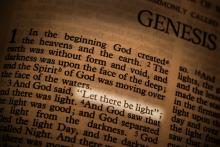
If you perused some of the headlines coming out of Slate the past couple weeks, you’ll find that, not only are Texas schools teaching creationism , schools all over the country are teaching creationism , and — even as we speak — lawmakers in South Dakota and elsewhere are introducing legislation that will let their schools teach creationism.
Such news leads me to one of two conclusions: Either the proponents of teaching creationism — a viewpoint I thought it was ruled unconstitutional by the Supreme Court in 1987 — have been very busy lately, or what passes for “creationism” in the eyes of the mainstream media these days has become pretty fuzzy.
I lean toward the latter.
Look, I’m a writer and a journalist, too. I get it. I understand the desire for a sexy, emotionally heavy word that “seems” to describe the given topic and will — of course — generates millions of clicks from the churning, polarized body politic that powers the Interwebs.
But this willy-nilly misapplication of the terms “creationist” and “creationism” simply has got to stop, and here’s why.
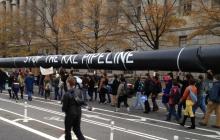
Friday at 3 p.m. ET, the State Department released their long-awaited final Supplemental Environmental Impact Statement of the Keystone XL pipeline extension, a proposed project from TransCanada to build a new pipeline for transporting tar sands crude oil from Canada to a refinery in Texas where it will likely be exported internationally.
Environmentalists and concerned citizens on the pipeline’s pathway have been waiting for the State Department to address previously ignored issues like the pipeline’s impact on climate pollution. President Obama said in a climate-focused speech last year that he would only approve Keystone XL if it did not pose a significant risk of climate pollution, so although State Department looked at other environmental risks as well (such as the 1,692 pipeline spills or incidents that occurred from 2002 to 2012 in the United States). This review concludes that the number of U.S. jobs to be created – once estimated in the tens of thousands – will actually be 50 operations jobs, with only 35 permanent. The rest (the touted 42,000 number) are all temporary construction jobs.
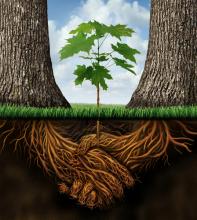
IN 2013, Sojourners commissioned a messaging study to contribute to the creation care movement—the Christian response to climate change. We polled nearly 1,100 people, oversampling for evangelical Christians, since evangelicals can be politically effective when activated on justice issues, as they have been on immigration, HIV/AIDS, and human trafficking.
Our goal was not only to learn evangelicals’ attitudes about climate change, but also to explore which messages are most compelling so we can better communicate on the issue and make an effective difference for God’s creation.
The first thing we learned was that many of the common stereotypes about evangelicals and climate change simply aren’t true. For one thing, the majority of evangelicals we surveyed (60 percent) agree that climate change is happening, and most say that human activity plays a role.
Second, one’s position on climate change is better predicted by political affiliation than by religion but, interestingly, evangelical Republicans are more likely to support action on climate change than non-evangelical Republicans. Young evangelicals are also more receptive to climate change messages than non-evangelical young people. And for those who don’t agree with us on climate change, there is a low level of certainty: Twenty-five percent of evangelicals are in the moveable middle, either “somewhat sure” that climate change isn’t happening or undecided. This means there’s a good chance that they already care, or that their opinion could be changed.
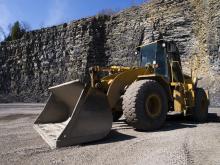
WEAK LAWS AND empty regulations in Canada allow Canadian mining companies to flourish in every corner of the world: Papua New Guinea, Chile, Argentina, Peru, Mexico, the Dominican Republic, all over Africa—anywhere local conditions are favorable for producing “low cost” metals; that is, any country where local government control mechanisms are weak or nonexistent.
Today, Canadian companies account for 75 percent of mining worldwide, and their practices are rife with abuse. The companies promise sustainability, responsibility, and a “win-win” situation for all, but there is a fundamental contradiction between their claims and the reality of massive open-pit, cyanide heap-leach mining, which devastates surrounding communities and the environment.

Bill Nye may be “The Science Guy,” but Ken Ham is the “Answers in Genesis” man, and a debate between the two over the origins of life has nonbelievers and Christians wringing their hands.
Nye, host of a beloved television science series, and Ham, president of a creationist apologetics ministry, will meet at the Creation Museum, where Ham is also the president, on Feb. 4. In what some wags are calling “the Ham-on-Nye debate,” they will weigh this question: “Is creation a viable model of origins?”
In truth, both sides answered that question long ago — Nye with Charles Darwin’s work on the origin of species and Ham with the first book of the Bible. Yet many observers — both religious and nonreligious — say the debate is a very bad idea.

Energy policy and climate change action are inexorably linked, like two oxen in a yoke.
The trouble with this set-up is that while climate action tends to look straight ahead, energy policy is apt to veer off on any number of paths, some of them quite well-meaning, like job growth or “energy independence.”
Last night’s State of the Union address by President Obama was, I’m afraid, one such experience for climate action, which compared to the huge bull of energy issues is a yearling at best. The yoke between energy and climate did get mentioned by the president, but the yoke pressed toward economic growth, the paradigm which many argue is responsible for our ecological crisis in the first place. It’s enough to strain a vertebra.

After two doves released by Pope Francis and two young children were attacked by aggressive predator birds, a leading animal rights group called on the pontiff to stop what they called “outdated traditions.”
The Vatican regularly releases doves as a symbol of peace, and in multiple instances they have been chased and sometimes captured and killed by more aggressive fowl in the area. But Sunday’s events were more noteworthy because the scene of a seagull and a crow swooping in to attack the doves was captured by several of the photographers in St. Peter’s Square as a crowd of tens of thousands — including several thousand children — looked on.
Both white doves managed to escape their predators after a brief tussle, but it’s unclear what ultimately happened to them.
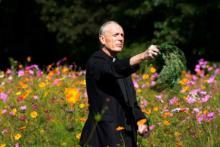
Growing up in small-town Georgia, John B. Johnson had family friends who ran the funeral home down the street, so the particulars of a typical American funeral — the embalming, the heavy casket, and remarks about how great the deceased’s hair looked — were all familiar to him.
When the time came, he assumed, his funeral would look much the same.
But Johnson, now 44, envisions a different sort of send-off for himself: a “green burial” that draws both upon his faith and his commitment to the environment. For Johnson and others like him, a green burial is a way to care for the Earth and answer to the part of his soul that recoils at the pomp of the average American funeral, and takes seriously the biblical reminder: “For dust thou art, and unto dust shalt thou return.”
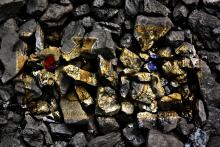
I’ll be upfront and admit it. When I heard about the chemical spill that shut down the water supply for 300,000 of my fellow West Virginians, I felt an odd tug of relief. “Maybe now something will get straightened out,” I thought to myself.
Sure, what I felt might sound callously unfeeling. After all, the chemical spill closed down businesses and schools, shut down bathing, and reduced populations to scrapping for potable water. Happily, thousands of neighbors and outliers pitched in to deliver water from bottles to tankers to the beleaguered people.
Welcome, world, to West Virginia, your national energy sacrifice state. Our state has a king — name’s Coal. Just as in Nebuchadnezzar’s era (Daniel 3), on cue politicians, business people, and media outlets bow their knee to King Coal lest their fates be a metaphorical fiery furnace.
Before readers think I’m off-track, let me first back up.
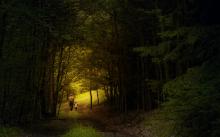
When you hear about stewardship in church, you probably think of your checkbook. Stewardship is the term we use to talk about financially supporting our churches and organizations. But another holy use of the word involves being stewards of creation.
When I hear the word stewardship, I feel the crunch of snow and branches under my feet. I see the trees and paths of the woods owned by my parents’ best friends, where I spent much of my childhood hiking, hunting, skiing, picking apples, and feeding chickadees out of the palm of my hand. It’s one of the places where I gradually heard my calling to work for the care of creation. And the word stewardship transports me to a specific day in my childhood, walking in the woods with my dad’s best friend, Leo, when he pointed to a tree and said he would have to take it down.
How could he kill a tree? I hassled him; I got indignant. I said that nature should be left alone to do her thing. But Leo explained that I was wrong — he managed the land. It wouldn’t be just fine on its own; rather, it needed his careful eye to manage the trails, cut down sick trees, and hunt deer.
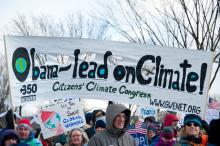
PHYSICS IS IMPLACABLE—it won’t bend even to politics.
Which is why it comes as bad news to see the charts on U.S. production of fossil fuels. During the Obama years, even as the president has been touting his administration’s success in reducing our domestic carbon emissions, it turns out that we’ve been drilling, mining, and fracking for more oil, coal, and gas than ever before. In fact, we’ve passed Saudi Arabia in oil production and are about to pass Russia in oil and gas output combined; meanwhile our coal exports have reached new highs. We’ve become the world’s biggest fossil fuel producer.
Which means that, precisely in the years when it’s become clear how much damage climate change is doing—the years of Midwest drought, of Hurricane Sandy—the United States has been bucking physics. We’re going in exactly the wrong direction.
The White House might make two arguments in response. One, it’s not their fault: The oil boom in places like North Dakota is all private enterprise. But in fact Obama’s done much to grease the skids for this boom: He’s opened up big offshore tracts for drilling, and even let the oil companies into the Arctic. His Interior Department has held auctions for vast piles of Powder River Basin coal.
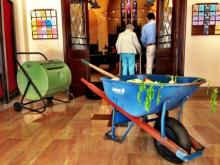
The wheelbarrow outside the sanctuary was overflowing with vegetable scraps; decomposing matter filled the baptismal font; and a pile of rich brown soil replaced the Communion table.
Ashley Goff, minister for spiritual formation at Church of the Pilgrims, wanted to convey a message about the cycle of nature this fall, and she could think of no better analogy than the congregation’s growing enchantment with compost.
“I wanted them to see the process of life and death and change,” she said of her Presbyterian Church (USA) congregation of 70. “It’s a dying and a rising, where new life begins.”
Across the country in the past decade, hundreds of houses of worship have started composting, relating it to theological concepts of resurrection and stewardship.

On the eve of 2014, why not plan your New Year’s resolutions around caring for God’s creation? Here are eight ideas for EcoResolutions.

This past Sunday, I had the opportunity to watch our children’s ministry present through play, song, and dance the story of the birth of Jesus Christ.
No matter how many times I have seen this story, it’s always amazing that this miracle that happened in a manger could have such a huge impact on the lives of so many. Jesus was not born with a silver spoon in his mouth, his parents did not have the best reputation, and he definitely wasn’t birthed in a fancy hospital. Instead, he was born where animals were kept — not the best conditions environmentally at all! Further, Jesus Christ became an advocate for the poor, for those that do not always have a voice, and for those that were suffering from terrible mistreatment, disease, and sickness.
I truly believe that Jesus’s focus on the “least of these” is a model for advocacy, especially for the environmental justice movement.
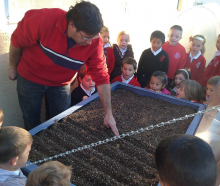
Online resources
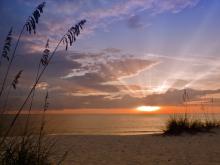
Editor's Note: New Vision Renewable Energy connects Christians with opportunities to provide renewable solar lights to people in the developing world. Their Christmas Lights Advent Devotional features daily readings and questions from prominent Christian thinkers, including Sojourners president Jim Wallis. This Day 10 of Advent devotional from Jim Wallis is reprinted and adapted with permission of New Vision Renewable Energy. You can find the full Christmas Lights Advent Devotional guide and solar light kits here: http://nvre.org/devotional-order.html
Proclaiming Jesus as light of the world is an audacious statement. It directly challenges all those idols that persistently attempt to replace God as the center of our lives and our world. In our culture, a selfishness that denies any obligation to anyone or anything beyond our own self-interest may be the greatest idol of all. It denies that demanding more and more energy at great cost to our environment and the people who live close to the land has problematic consequences. We have lost sight of the common good and the consequences have been devastating.
In many places, hope has turned into despair. Darkness seems to be crowding out light. From where will our help come from?
BALLS THUMPED against the walls, jump ropes scraped the asphalt, and shrieks filled the air: The kindergarten and first-grade students of Holy Ghost Catholic School in Albuquerque, N.M., were at recess on a chilly December day. The sun was shining and the kids bumbled around in their jackets, oblivious to the cold. Also oblivious were the rows of leafy greens in the two raised-bed gardens just outside the classroom windows. The sun, plastic covers, and just enough water (which the students figured out after a failed crop or two) made for a perfect little garden oasis in the midst of winter.
Seeing me headed toward the gardens, dozens of children made a beeline for the structures, simultaneously shouting “Miss! Can I see?” “Miss, I’ll water them!” They helped me lift the cover to reveal a jungle of rainbow chard, kale, spinach, salad greens, a few radishes, and basil—a kaleidoscope of greens, golds, pinks, and yellows.
“Miss, can I have chard?” Mateo looked at me hopefully, chubby fingers pointing to the rainbow chard. “Sure!” I exclaimed, gently breaking off a leaf. “If you can name it, you can taste it!” Suddenly there were 15 hands in front of me, along with a litany of names: “The pink one!” “Chard! Chard!” “Can I have that spinach?!”
Not everyone was as enthusiastic. “Yuck,” Lenaia said when I offered her a piece of spinach. “I don’t want to eat it, but I’ll water it.”
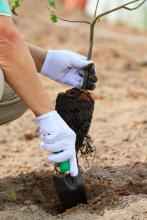
Many believers are familiar with the term “medical missions.” Less well known, though a growing awareness is popularizing the movement, is the field of environmental missions. The idea’s biblical base is to combine God’s creation care mandate with the additional call of Christ’s “great commission.” What that means and looks like and how it can be cultivated into fruition is the subject of Lowell Bliss’s new book, Environmental Missions: Planting Churches and Trees. Bliss is the director of environmental missions organization Eden Vigil.
The purpose of the newest category of missions, Bliss asserts, is two-pronged. The goal is to integrate the dual aims of the environmental missionary: to care for the environment and to make disciples. Why? Because God is a both/and God, not an either/or God. He cares for both people and the planet; he is concerned with saving both souls and soil. Following Jesus’ example, then, we can be both people and tree-huggers.
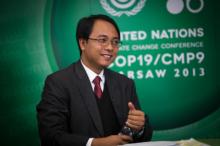
The latest United Nations climate summit got off to an unusually emotional start when Yeb Sano, the head delegate from the Philippines, issued a tearful plea at the opening plenary.
With his country ravaged by Typhoon Haiyan — the kind of extreme weather that experts say is becoming more common due to climate change — Sano choked back tears as he announced he would fast in solidarity for his countrymen left without food.
Sano said on Nov. 11 he would refrain from eating during the conference unless important progress was made. Sano’s gesture has so far failed to trigger much of a change in the entrenched negotiations, and with talks expected to stretch into the weekend, he is still on his hunger strike.

Many Christians these days are trying to consume less, and they’re doing so for a variety of reasons. For some, in the wake of the economic downturn, thrift is a simple necessity. Others, inspired by books such as Shane Claiborne’s The Irresistible Revolution, Jen Hatmaker’s 7: An Experimental Mutiny Against Excess strive for simplicity for the sake of the health of God’s creation and for the sake of our neighbors, both local and global, who must do without even the basic necessities of life. It’s no secret Americans spend — and waste — a lot.
But how do we begin to consume less? And once we become aware of the horrific conditions under which much of our stuff is made, how do we avoid being overwhelmed by all the injustice that may lie behind our new phone or pair of jeans? And even if we simplify by paring down our wants, what do we do when we actually need to buy something?
Here are some simple strategies to help you live lightly without being overwhelmed by it all.